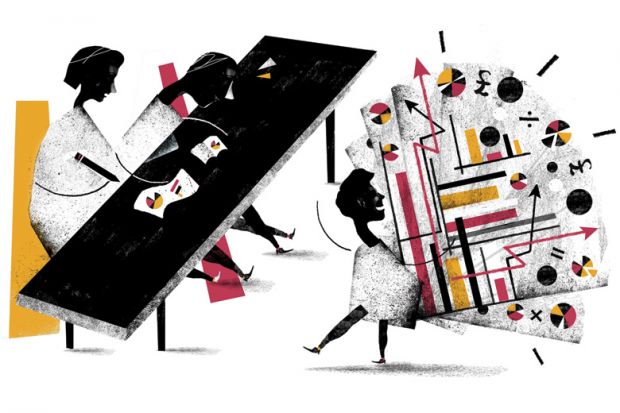On bad days, I think I’m the world champion of staring at half-finished articles. I have one, on the literature of epidemic in 17th-century England, that I’ve been calling “The Everlasting Plague” for months now.
As an early career researcher in my first temporary lectureship, I’m keenly aware of the need to publish: I’ve been trained from the first days on my PhD that publishing is the best way to convince employers that one is employable. Academia can seem to be all about producing research outputs, promising research outputs and worrying about one’s perceived lack of research outputs – and the worrying, at least, feels like a growth industry.
This industry was rocked by Lord Stern’s Building on Success and Learning from Experience: An Independent Review of the Research Excellence Framework, and particularly by the recommendations about “non-portability”. The idea that researchers will not be able to transfer research outputs produced while at one institution to another sent much of Academic Twitter into a flutter. Non-portability is likely to affect ECRs disproportionately: as temporary academic jobs proliferate, we have to move between institutions with increasing frequency, which can – especially in the case of longer-term projects such as monographs – make it tricky to assess who “owns” our research, and what we can do with it.
Among us wailing masses, calmer heads reminded us that this was just a report making recommendations. Meanwhile, Cambridge physicist Dame Athene Donald wrote a blog for Times Higher Education suggesting that the recommendations will benefit ECRs because we will have more control over when and how we enter the job market, and won’t necessarily need to make full research submissions in the early years of a new job. She also argues that the outcry over non-portability results from the fact that most academics can’t remember “a world in which there wasn’t a hiring frenzy in the lead-up to some artificially constructed deadline”.
That point about memory holds true for me. I never knew higher education before the first research assessment exercise (the REF’s predecessor) in 1986, when my research activity still consisted mainly of trying to eat things I shouldn’t. The universities I’ve known have existed in a more or less constant state of preparing to have research assessed, having research assessed, and cheering or bewailing the results.
The default advice to PhD students and ECRs, for years now, has therefore been: when in doubt, get your research out. When you’re unemployed, it’s the mantra you’re supposed to live by. At bad times, this advice feels comically misplaced: attempting to publish while working full-time outside the academy, unable to access institutional resources, is an intensely depressing experience. The idea that we might move away from this has its attractions.
However, Donald’s piece left me with a big question: how are we supposed to try to make ourselves attractive to employers if we’re no longer bringing them potential REF submissions like a cat depositing a dead bird on their pillow? Is this going to be like filling out Ucas applications, where your teacher shrugged and said, “I don’t know, say you play tennis or something”? I’m terrible at tennis. I have a much better chance of some day finishing the plague article, but perhaps I should sit on it instead.
I’d ask my academic network for guidance, but the great majority of the excellent people I wail at for help have worked for their entire careers within a context in which research is portable employer-attracting currency. Academia is a complex game of metrics and reputation and mysterious alchemy: as young researchers, we rely on those higher up the ladder to give us pointers on how to play it. I know who to email for advice on a job application, or what blogs to read if I’m stuck on article revisions. This substrate of advice won’t disappear if non-portability is implemented, but its connection with ECRs’ lived realities will weaken. The game will remain a game, but fewer people will know how to play it.
Donald’s piece felt distant to me, and eventually I realised why: there’s no real sense of worry. She is arguing that things will improve, that in the long run non-portability is good for academia. But fear – the fear that one isn’t good enough, that one won’t be able to pay the rent, that one’s future isn’t secure – is a fundamental and horrible aspect of the ECR experience. Donald’s imagined ECRs are “excellent scientists” with exciting postdoctoral opportunities, who do “one superb piece of work” in one job and another in the next. These are scholars who produce discrete pieces of work fast: something much easier in the article-focused sciences than in disciplines that value monographs.
We need to create a REF that works for the unemployed ECR, the temporary teaching assistant, the postdoc in a major laboratory and the bright new permanent lecturer – and to find ways of supporting them all through the new process. As yet, Stern’s recommendations and Donald’s reassurances seem geared towards those already winning the game.
Kirsty Rolfe is lecturer in early modern studies at Queen Mary University of London.
Register to continue
Why register?
- Registration is free and only takes a moment
- Once registered, you can read 3 articles a month
- Sign up for our newsletter
Subscribe
Or subscribe for unlimited access to:
- Unlimited access to news, views, insights & reviews
- Digital editions
- Digital access to THE’s university and college rankings analysis
Already registered or a current subscriber?





